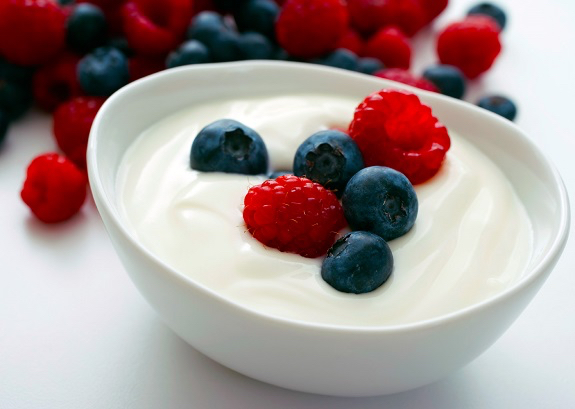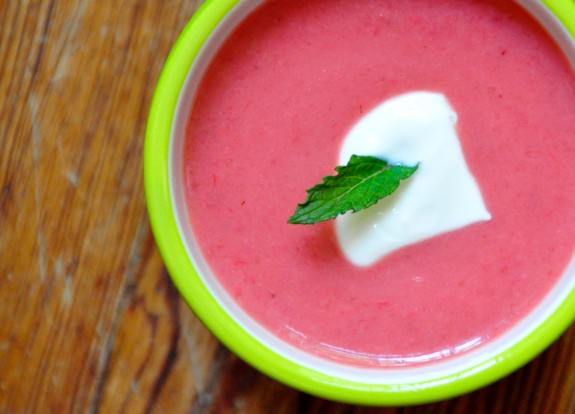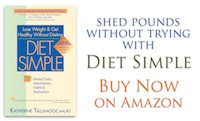Rev-Up Your Immune System Through Nutrition
- At March 11, 2020
- By Katherine
- In Articles, News
 0
0
Check out CNN’s video featuring Katherine’s immune-boosting tips:
What you eat profoundly affects your ability to fight disease. With all the nasty bugs going around this cold and flu season, it’s especially important to pay attention to boosting your immune system through nutrition. While every nutrient is important for your body’s ability to prevent and fight disease – from colds to cancer – certain nutrients play key roles:
Found naturally in yogurt and kefir, probiotics nourish your gastrointestinal tract’s microbiome, that is, its microscopic ecosystem of cells called “microbes.” The health of your microbiome can make – or break – your health in every way. Eating foods high in probiotics (and prebiotics) is the best, if not the only, way to make sure your microbiome is filled with those healthy microbes.
But probiotics can’t work alone. To be effective, you also need foods containing prebiotics, certain high fiber plant foods, to create the good health you desire. Prebiotics nourish probiotics. Together they form the critical prebiotic/probiotic duo creating a microbiome teeming with healthy microbes that achieve the superior level of beneficial microbes that fight off chronic and acute diseases.
While not always, microbes usually live in harmony with their human hosts. They inhabit just about every part of the human body, living on the skin, in the gut, and up the nose. The healthy ones, increased with probiotics, are essential for good health and survival.
But there are dangerous ones, too, that cause disease and death. The typical American diet and lifestyle produce more of the disease-causing microbes. Your health and quality of life suffer dramatically when the unhealthy microbes outnumber the healthy ones. The only way to keep that from happening is to consistently nourish your body the right way so you can be as healthy, happy and energetic as possible.
Your prescription:
DAILY eat yogurt or kefir, in whatever form you like best
Protein
Protein is one of the most important nutrients in the human body, second only to water. Bone health, muscle function, muscle strength, muscle mass and immune function — all are impaired with a low protein intake. In fact, the antibodies which are essential to protecting your body against pathogens, are made of protein, so without enough protein, your body has no chance. Certain vulnerable populations, such as the elderly, children, and those who already have compromised immune systems, should be particularly careful to eat enough protein – in fact, even more than the recommended dietary allowance – for maximized protection.
Protein can be found in a wide range of foods. Animal protein is in seafood, dairy, meat, poultry and eggs. Vegetarian protein can be found in legumes, soy, vegetables and whole grains. And while it’s true that high-protein foods often bring fat and calories along as uninvited guests, it doesn’t have to be that way. The lowest-calorie animal protein sources are the leanest. Go for eggs, seafood, poultry with no skin, skim milk, nonfat or low fat yogurt, and low fat cheeses are also great options. Soy products also provide great low-calorie options and are high quality proteins similar to animal protein.
Protein foods have other benefits. Fish, legumes, seeds, nuts contain immune-boosters zinc and iron (but in too high quantities, for instance in megadose vitamin pills, can backfire and suppress the immune system). Dairy products (keep them fat-free or low fat) are naturally loaded with magnesium, potassium and calcium – all important for immune function. Beans and soy beans are high in iron, zinc and magnesium.
Fats and Oils
The type of fat you eat can improve the effectiveness of your body’s immune response because fat ends up in all of your body’s cell walls. It acts as a cell lubricant, improves flexibility and communication between cells, and is important for cell metabolism and gene expression. If the fat you eat is saturated – solid at room temperature – as in butter or animal fat – this decreases cellular flexibility and functioning. So, to maximize your immune response, use oils in your cooking, such as olive oil (for drizzling), peanut/nut oils (for high heat cooking), and canola oil (for high heat cooking), and stick with foods high in heart-healthy fats, such as nuts, avocados and fatty fish, which is high in omega-3-fatty acids. Minimize animal fats in dairy products, red meats, butter, cream, or too many foods or desserts containing said ingredients. They increase the incidence of cardiovascular disease. Red meats (pork, beef, lamb) also increase the risk of many cancers, particularly when they’re cured.
Vitamins and Minerals
Studies show all nutrients are involved in your immune response but taking high doses of certain nutrients can cause imbalances, backfire, and actually suppress your immune response. So it’s ideal to get your vitamins and minerals from a nutrient-rich, balanced diet. Though you may benefit from taking a basic multi-vitamin and mineral supplement to cover your bases. And there may be some exceptions depending on your own nutritional status (best to get personalized advice from your dietitian and doctor)…
Vitamin D
New research has found Vitamin D augments the body’s ability to eliminate disease-infecting microbes, and most of us are deficient in Vitamin D, which we get from the sun and very few foods. Your doctor should check your vitamin D status at your next visit to make sure your blood values are adequate to fight infection, among other things. That said, most of us need a vitamin supplement with vitamin D, usually somewhere between 1,000 and 4,000 IU/day. But check your blood values first. They should be somewhere between 50 and 75 for most people. Check out my “Vitamin D” article for more details…
For Those Over 50
Vitamin E
Studies from Tufts University found that vitamin E supplementation may help fight the common cold and other upper respiratory tract infections. The recommendation is about 400 IU/day
Zinc
Zinc helps fuel the production of infection-fighting white blood cells so a lack of zinc reduces immune response and illness recovery time is prolonged. The elderly are particularly vulnerable to deficiencies and may even need more than normal. So here’s another case where a supplement may be useful. When zinc supplements were given in a nursing home, residents reduced their risk of contracting pneumonia, according to researchers from the Jean Mayer USDA Human Nutrition Research Center on Aging at Tufts University.
Vitamin B 12
Vitamin B 12, another nutrient important for immune function, is poorly absorbed in many elderly patients (and is missing from the diet of vegans) which is why your vitamin B 12 status should be checked by your doctor and you may need a supplement – in the form of an injection. For most of us, though, B 12 is easily obtained and absorbed by eating any animal products.
The following is a list of foods containing key immune-boosting nutrients.
Include them in your diet every day:
High Beta Carotene Foods
Orange and deep green veggies and fruits, particularly…Carrot juice, carrots, butternut squash, pumpkin (or any orange-colored winter squash), sweet potato, greens such as spinach, collards, kale, turnip greens, beet greens, orange melons such as cantaloupe, red peppers, apricots, broccoli, plums, mangos papayas, plantains, Brussels sprouts, watermelon, asparagus
High Vitamin C Foods
Citrus fruits such as orange, lemons and grapefruit, peaches, sweet and hot peppers, papayas, pineapple, strawberries, broccoli,kiwi fruit, sweet potatoes, Brussels sprouts, kohlrabi,
High Zinc Foods
Oysters, lobster, crab, clams, fortified whole grain cereals, beans (legumes such as lentils, chick peas, black-eyed peas, soy beans, kidney beans, limas, pintos), turkey, whole grains such as buckwheat, whole wheat, cracked wheat (bulgur), oats, whole grain cornmeal, wild rice, yogurt, pine nuts, sunflower seeds, mixed nuts, peanuts
High Magnesium Foods
Whole grains such as buckwheat, wheat, oats, cornmeal, barley, brown rice, Also soybeans, pumpkin seeds, brazil nuts, cashews, greens such as spinach, beet greens, fish such as halibut, haddock and flounder and sole species, beans (legumes such as black beans, white beans, soy beans, navy beans, limas, black-eyed, great northern, kidney, chick peas,. lentils)
High Vitamin E Foods
Sunflower seeds, almonds, sunflower oil, safflower oil, canola oil, hazelnuts, pine nuts, spinach, turnip greens, beet greens, dandelion greens, canned pumpkin, carrot juice, broccoli, sweet potato, sweet red peppers, mangos, papayas
Cranberries
Have antibacterial qualities. Eat them dried for the highest levels of nutritious compounds
Have a myriad of beneficial health effects. They’ve been shown to boost the immune system, especially in relation to cancer. Called a “drug-botanical interaction,” mushrooms appear to increase the effects of chemotherapy, and lengthen survival.
Mushrooms also reduce fatigue.They act on the muscular system, body antioxidant system, cardiovascular system, hormone system, and immune system, all of which improve liver function, blood circulation, and blood glucose regulation, among other benefits.
Immune-Boosting Eating Strategies
* Eat a lean protein source at every meal – including breakfast, lunch and dinner. 20 grams for women and 30 grams for men is the amount most bio-available per sitting.
* Eat 5 cups of fruits and veggies per day – especially colorful varieties, eat at every meal and snack
* Eat a vegetarian meal every day using beans or soy beans for protein,
* Eat fish high in omega-3-fatty acids, such as salmon, herring, anchovies and sardines, at least two to four times per week, and vegetarian sources such as walnuts, ground flax seeds and canola oil,
* Use canola oil in your cooking and a fresh, newly harvested olive oil for drizzling,
* Eat whole grains at breakfast (such as cereal with skim milk or soy milk) and with sandwiches or wraps at lunch,
* Snacks: Try fat-free yogurt and fruit, fat-free yogurt dip or hummus with veggies,
* Toss nuts/seeds/dried cranberries in your whole grain cereal, your salad or your afternoon yogurt snack
* Skim milk or Soy lattes or teas are great snacks, too…
* Take a multivitamin-mineral supplement daily.
* Take a Vitamin D Supplement so that you are getting 1,000 to 2,000 IU/day
* If you are over 50, but particularly 65, look into supplementing your diet with Vitamin E, Vitamin B12, Zinc and probiotics such as lactobacillus in yogurt.
Of course, don’t forget to keep your blood moving by being moderately physically active with plenty of walking, yoga, etc. Get plenty of rest, wash your hands frequently, drink fluids (especially warm fluids which will send light steam into your nasal passages) and spend time with friends and loved ones. Studies have shown these habits increase your ability to conquer diseases – from colds to cancer.
Why Is Eating Yogurt Daily – and Your Gut’s Health – Creating a Health Care Revolution?
- At February 12, 2018
- By Katherine
- In Articles, News
 1
1
Possibly the most significant nutrition discovery in decades is all about your gut, and it can make or break your health, in ways that are shocking. I’m not exaggerating when I say that it has caused a health care revolution. A healthy gut affects every organ in your body – from your brain to your toes – and, for a variety of reasons, most Americans (and that could be you) have an unhealthy gut, one that causes disease and distress. I believe eating yogurt daily is one of the only methods, and certainly the easiest one, we can use to make up for the healthy gut we abused and lost while growing up and now as adults. Why is this critical for your future and your health, as well as the health of your children, friends, relatives, and your elderly parents?
For years, I’ve wondered why people who regularly ate this versatile food seemed more likely to enjoy superior health, fight off illness more effectively, lose body fat more easily – while keeping, and even increasing muscle, seemed more alive, energetic and happy (and even if those benefits were a figment of my imagination). Thankfully, scientific research is now backing my observations of 25+ years. This has been a remarkable nutrition discovery. We always knew the microbiome (the 100 million cells in your gastrointestinal tract) was important, but the new studies show the effects of a healthy or unhealthy microbiome are vast, more than we ever could have imagined. The tired, old saying, “You are what you eat,” Is truer than we ever realized!
The health of your microbiome starts in utero, continues at birth, and in infancy. If you were breastfed, you have many health advantages. For instance, you are less likely to be obese or have diabetes later in life. That’s because breast milk is filled with healthy microbes, called probiotics (and prebiotics, which I’ll discuss later), which boost your immune system. They also decrease insulin resistance, thus lowering your blood sugar and insulin levels. Insulin is a “growth factor” which, when too high, is correlated with heart attack, colon cancer, and other cancers, and is a precurser to diabetes. It is also associated with increased inflammation, a risk factor for diseases from the cold, to arthritis, even mental health and risk for cognitive decline and Alzheimer’s.
One cause leading to an unhealthy microbiome in developed countries, is a diet composed of low fiber, refined foods, and a dearth of whole grains, fruits and vegetables. You need these high fiber foods (called prebiotics) to nourish the probiotics, and together in the GI tract they form the critical prebiotic/probiotic duo creating a microbiome teeming with healthy microbes that fight off chronic and acute diseases.
One study found when children are given a high level of antibiotics, they experience more obesity, diabetes and infections later in life when compared with children who received less antibiotic therapy. Of course, antibiotics save lives! But they not only destroy bad, disease-causing bacteria, they also destroy the healthy microbes/bacteria. Scientists are working on finding a balance that would make antibiotics kinder to the good microbes which kill off disease naturally.
It seems the healthiest microbiomes start in infancy, and once that window is closed, it may be very hard, if not impossible, to make up for it as adults. As you age, healthy gut microbes decrease, but when you’re elderly particularly, you are more prone to disease-causing microbes such as Salmonella and E-Coli, making the need for a healthy microbiome more important than ever.
As of yet, there is no test to measure your gut microbes, or the health of your microbiome. We don’t even know everything that we need to be looking for! The gastrointestinal tract is still quite mysterious and idiosyncratic. I work with many clients with GI issues, and their solutions vary widely.
That’s why I believe foods such as yogurt, which contain natural probiotics, are critical to your health. I push all my clients to eat yogurt daily, and I do as well. When someone tells me they don’t like it, I insist they try every flavor or type imaginable until they find one they enjoy. There are even yogurts that are more like desserts, so I encourage people to enjoy those if those are the only yogurts they find delicious (yes, deliciousness is important!). Plain Greek yogurt can be used in place of sour cream in recipes. I used it on my Swedish waffles (picture above), along with fruit, and it’s a delight!
A New Recipe For Improving Seasonal Allergy Symptoms
- At March 06, 2017
- By Katherine
- In Articles, News
 0
0
My clients who suffer from seasonal allergies were hit hard this year – and earlier than usual. The warm February temperatures caused Washington’s flowering trees and shrubs to come out of their winter slumber gloriously. Our famed cherry trees and camellias are almost in full bloom. Even my hydrangeas’ buds are peaking out.
This beautiful display does not feel so beautiful for people with spring allergies. They often have symptoms, caused by the flowers’ pollen, which impact their quality of life: lack of sleep, reduced productivity at work or school, emotional stress and embarrassment…. and the medications designed to improve those symptoms, depending on the person, may be no better, and cause dry mouth, sleeplessness, and drowsiness. A new study set out to test if certain strains of beneficial probiotic bacteria would reduce symptoms and improve quality of life during allergy season for its sufferers.
The study, published in the American Journal of Clinical Nutrition, the first randomized, double blind, placebo-controlled trial – the gold standard of human research – testing this hypothesis, divided 178 allergy sufferers into two groups and tested them during spring allergy season for eight weeks. One group received the probiotic supplement*, the other received the placebo.
The study found the probiotic group experienced improved quality of life symptoms compared to the placebo group. That said, scientists are still working out which of the beneficial probiotic bacteria work best with individual allergens, when to start taking them, and which probiotic bacteria will react most positively with a person’s specific microbiota (the 100 million bacterial organisms in your digestive tract), as each person’s microbiota is different. They mentioned that starting probiotics at a younger age may be more effective, too.
In the meantime, I believe eating foods which naturally contain beneficial probiotic bacteria, such as yogurt, is the best solution for trying to reduce your allergy symptoms. In fact, I recommend eating yogurt every day! Though, I don’t recommend counting on supplements because, as of now, no probiotic supplements have passed the tests allowing them to make a health claim.
Here’s one of my favorite yogurt recipes developed by Georgetown resident, cookbook author, and my friend Najmieh Batmanglij, and found in my book, Diet Simple…
Najmieh Batmanglij’s Yogurt and Spinach Dip
*(Lactobacillus gasseri KS-13, Bifidobacterium bifidum G9-1, and Bifidobacterium longum MM-2 provided by Wakunaga of America Co Ltd)
Yogurt’s Vast Array of Health Benefits
- At November 16, 2015
- By Katherine
- In Articles, News
 0
0
Yogurt has long been considered a healthy option, as it’s packed with protein, calcium, potassium and other nutrients. It’s a great way to get probiotics, which are important for improving digestive health; but also a vast array of health conditions.
Yogurt consumption has been shown to improve bone health (eating yogurt lead to better bone mineral density) and cardiovascular health (yogurt-eaters were 31% less likely to develop high blood pressure), lower one’s risk of getting Type 2 diabetes, and be a useful tool in weight management.
Many of these benefits come from the probiotics found in yogurt, which are associated with a myriad health improvements. Evidence shows that probiotics could help prevent Type 2 diabetes by preventing insulin resistance and allowing your body to more readily burn body fat. But probiotic benefits may go beyond that. Some studies have even shown that probiotics led to improvements in immune functions in HIV-infected patients.
The research is clear: yogurt is a great addition to any diet, particularly if you want to improve your immune response and powers of healing, bone, heart, gastrointestinal health or improve your weight. Pick some up today! I believe any type will do… as long as you eat at least one or two cups per day.
What’s More Damaging: Sugar? or Artificial Sweeteners?
- At October 08, 2014
- By Katherine
- In Articles, News
 1
1
Katherine’s 5 Tips are at the end of the article…
For years, my clients have asked me, “Is it better to eat ‘sugar-free’ yogurt? Or, yogurt with fruit on the bottom with all that sugar? What about sugar in my coffee? Sugar-sweetened beverages, like soft drinks?” My answer has alway been, to my clients’ surprise, “A little sugar won’t hurt. Eat the yogurt you enjoy the most, even if there’s a little jam at the bottom! And a teaspoon of sugar in your coffee shouldn’t do any harm.” New scientific research may prove my moderate approach has been right all along.
Artificially sweetened beverages and foods are seen as guilt-free pleasures, because they are lower in calories – or even zero calories – compared to other similar foods. You may think of them as a great choice when you’re trying to lose weight or trying to keep blood sugar in check. But some surprising new research suggests that artificial sweeteners might actually do the opposite, “by changing the microbes living in our intestines [1],” according to experts at The National Institutes of Health.*
To explore the impact of various kinds of sweeteners on the zillions of microbes living in the human intestine (referred to as the gut microbiome), an Israeli research team first turned to mice. One group of mice was given water that contained one of two natural sugars: glucose or sucrose; the other group received water that contained one of three artificial sweeteners: saccharin (the main ingredient in Sweet’N Low®), sucralose (Splenda®), or aspartame (Equal®, Nutrasweet®). Both groups ate a diet of normal mouse chow.
To their surprise, the researchers discovered that many animals in the artificial sweetener groups—especially those that drank saccharin-sweetened water—developed a condition called glucose intolerance, which is characterized by high blood glucose levels and is an early warning sign of increased risk for developing type 2 diabetes. In contrast, the animals that drank sugar water remained healthy.
The result was puzzling. These mice weren’t consuming natural sugars, so what was raising their blood glucose levels? The researchers had a hunch that the answer might lie in the gut microbiome—since those microbes play a vital role in digestion. Their suspicions were borne out. When they used DNA sequencing to analyze the artificial sweetener group’s gut microbiome, they found a distinctly different collection of microbes than in the animals drinking sugar water.
The next step was to distinguish whether these changes in the microbiome resulted from high blood glucose, or caused it. When the researchers used antibiotics to wipe out the artificial sweetener group’s gut microbes, their blood glucose levels returned to normal—evidence that the gut microbes were actively causing glucose intolerance. Additional proof came from experiments in which the researchers transplanted microbes from both groups of mice into the intestines of a mouse strain that had been raised in a sterile environment from birth. The germ-free mice that received microbes from the artificial sweetener group developed glucose intolerance; those getting microbes from the sugar group did not.
But what about humans?
The research team examined clinical data from 400 people taking part in an ongoing nutrition study. That analysis showed that, compared to people who didn’t use artificial sweeteners, long-term users of artificial sweeteners tended to have higher blood glucose levels and other parameters often associated with metabolic diseases like diabetes, obesity, and fatty liver.
Next, the researchers asked seven healthy human volunteers, who had never previously consumed foods or beverages containing artificial sweeteners, to consume the daily maximum dose of saccharin allowed by the U.S. Food and Drug Administration for six consecutive days. Of the seven volunteers, four developed glucose intolerance, while three maintained normal blood glucose regulation. The researchers then took intestinal microbes from human volunteers and transplanted them into germ-free mice. Microbes from humans with glucose intolerance also triggered glucose intolerance in the mice, while microbes from humans with normal blood glucose had no effect.
Previous studies have associated changes in the gut microbiome with obesity and diabetes in humans [2, 3, 4]. But the latest findings, which still must be confirmed in larger studies and by other groups, advance our knowledge one step further by suggesting that artificial sweeteners may be one of what’s likely to be an array of factors with the power to shape such changes. Who knows what the next piece of that fascinating puzzle might be?
Katherine’s 5 Tips
- Use artificial sweeteners with caution,
- Just a spoonful of sugar/jam/honey can’t hurt – maximum 10% of your calorie needs – for example, if you need 1,500 calories per day, enjoy 150 calories worth of sweets per day,
- As usual, moderation is key. If you have trouble eating too many sweets, find out why and click for strategies,
- Eat plenty of yogurt, which contains natural probiotics, to populate your gastrointestinal tract with healthy microbes (they may help reduce body fat and insulin resistance),
- Eat plenty of high fiber foods, considered “prebiotics,” which increase the effectiveness of the probiotics, helping your gastrointestinal tract stay healthy,
- If you have an interest in learning more about sugar substitutes, take a look at the Center for Science and Public Interest’s “Sweet Nothings: Safe or Scary… The Inside Scoop on Sugar Substitutes.”
References:
[1] Artificial sweeteners induce glucose intolerance by altering the gut microbiota. Suez J, Korem T, Zeevi D, Zilberman-Schapira G, Thaiss CA, Maza O, Israeli D, Zmora N, Gilad S, Weinberger A, Kuperman Y, Harmelin A, Kolodkin-Gal I, Shapiro H, Halpern Z, Segal E, Elinav E. Nature. 2014 Sep 17.
[2] Microbial ecology: human gut microbes associated with obesity. Ley RE, Turnbaugh PJ, Klein S, Gordon JI. Nature. 2006 Dec 21;444(7122):1022-3.
[3] A metagenome-wide association study of gut microbiota in type 2 diabetes. Qin J, Li Y, Cai Z, Li S, Zhu J, Zhang F, Liang S, Zhang W, Guan Y, Shen D, Peng Y, Zhang D, Jie Z, Wu W, Qin Y, Xue W, Li J, Han L, Lu D, Wu P, Dai Y, Sun X, Li Z, Tang A, Zhong S, Li X, Chen W, Xu R, Wang M, Feng Q, Gong M, Yu J, Zhang Y, Zhang M, Hansen T, Sanchez G, Raes J, Falony G, Okuda S, Almeida M, LeChatelier E, Renault P, Pons N, Batto JM, Zhang Z, Chen H, Yang R, Zheng W, Li S, Yang H, Wang J, Ehrlich SD, Nielsen R, Pedersen O, Kristiansen K, Wang J. Nature. 2012 Oct 4;490(7418):55-60.
[4] Gut metagenome in European women with normal, impaired and diabetic glucose control.Karlsson FH, Tremaroli V, Nookaew I, Bergström G, Behre CJ, Fagerberg B, Nielsen J, Bäckhed F. Nature. 2013 Jun 6;498(7452):99-103.
*The article above is from the National Institutes of Health
Photo by www.sugar.org
Healing Nutrition
- At May 06, 2012
- By Katherine
- In Articles, News
 1
1
It’s scary thinking of my mother going through surgery. I’m especially concerned that she maintain her active life here in Westlake Village, California. Mom has tons of friends, she volunteers at the Thousand Oaks Civic Arts Center, and she and Dad even work as Crossing Guards at local elementary schools. They regularly attend concerts at Hollywood Bowl (she LOVES Pink Martini),visit wineries, well, you get the idea. They may be “retired,” but they’re definitely not retired from living life!
To get her back to fighting form as soon as possible, she’s following my special “Healing Diet.” My healing diet worked beautifully after her hip replacement surgery 5 years ago; she healed quickly, and without the weight gain she dreaded. So I’m back again repeating the performance!
What you eat profoundly affects your ability to recover from surgery or heal from any injury. Everyone’s nutritional needs are different, but there are general rules of thumb for maximizing your body’s ability to heal through foods.
Healing Nutrition Principles
Because you’re sick or recovering from an illness or surgery, you are inactive. That means your calorie need is usually quite low (there are exceptions), but to heal properly, your nutrient intake must be high. It’s challenging to keep calories low, yet nutrients high; but it is very do-able, and I have successfully helped many people (including my mother) recover from surgeries and illnesses without weight gain, and even some weight loss – while at the same time – healing quickly and effectively. To do this, concentrate on nutrient-dense, low calorie healing foods, eaten at regular time through the day.
Protein
Protein is one of the most important nutrients in the human body, second only to water. Protein is critical for healing. Immune function is impaired without enough. The antibodies essential to protecting your body against pathogens are made of protein. Protein builds muscle and tissue, broken down after injury or surgery.Without enough protein, your body has no chance to heal.
Certain vulnerable populations, such as the elderly, children, and those who already have compromised immune systems, should be particularly careful to eat enough protein – even more than the recommended dietary allowance – for maximized protection. Your protein needs should be individualized and, to maximize your body’s ability to absorb and use the protein, should be eaten in small amounts through the day. Stick with lean, low calorie protein sources since you’re not active (see examples below). Learn more about protein…
Fats and Oils
The type of fat you eat can improve healing and the effectiveness of your body’s immune response because fat ends up in all of your body’s cell walls. It acts as a cell lubricant, improves flexibility and communication between cells. If the fat you eat is saturated – solid at room temperature – as in butter or animal fat – this decreases cellular flexibility and functioning. Learn more about healthy, healing fats… Eat healthy fats at each meal, but keep your fat intake low, as fats are high in calories, and since you’re inactive, you must keep your calorie intake low.
Katherine on “The Daily Show with Jon Stewart”
- At March 17, 2012
- By Katherine
- In Articles, News
 13
13
Milk: “It Does A Body Bad?” … Ed Helms Reports!
The Daily Show’s Ed Helms (“The Office”) Investigates Weapons of Mass Destruction you may be harboring in YOUR OWN REFRIGERATOR!
















